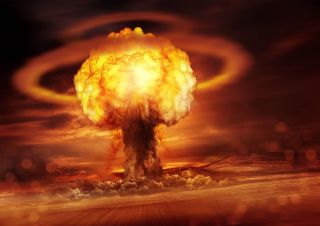Anxiety
Nuclear Anxiety, "Oppenheimer," and Prometheus
How the new movie and current politics might rekindle an old illness.
Posted August 4, 2023 Reviewed by Hara Estroff Marano
Key points
- Nuclear anxiety became increasingly common from the 1960s to 1980s.
- Current wars and instability have pointed towards a resurgence of nuclear anxiety.
- Nuclear anxiety would benefit from similar treatments as other anxiety disorders.

By Marsal Sanches, M.D., Ph.D.
The recently released movie Oppenheimer displays an admirable description of the events that led to the development of the first atomic bomb. Following the life trajectory of the title character, physicist J. Robert Oppenheimer, the movie immerses the audience in the dawn of the nuclear age, mostly from the point of view of its inventor. It allows viewers to experience his excitement, fears, doubts, conflicts, and, ultimately, his guilty conscious.
Moreover, the movie is the perfect catalyst for a discussion about a syndrome that was the object of great interest during the Cold War years: nuclear anxiety.
The term nuclear anxiety was first proposed in the 1960s by anthropologist Margaret Mead. It is defined as the “fear of a nuclear war and its consequences.” In a more comprehensive sense, it can include a wide range of psychological issues: concerns and ruminations about the possibility of a nuclear war, fear of the future, a sense of decreased life purpose and satisfaction, phobic-like reactions associated with topics directly or indirectly related to nuclear war, and, paradoxically, the denial of the possibility of a nuclear holocaust.
In one study, nuclear anxiety was found to be associated with depressive issues and substance use, suggesting that this condition, more than just a “normal” psychological reaction to a particular historical moment, might actually represent or lead to a degree of psychological illness. As a matter of fact, the condition generated enough attention from psychologists to result in the creation of a specific scale aiming at its quantification, the Nuclear Attitudes Questionnaire. Comprised by 15 items, this diagnostic questionnaire was used in several studies that pointed to a trend of increased nuclear anxiety among college students during the 1980s.
The interest in nuclear anxiety, at least from an academic point of view, seems to have decreased after the end of the Cold War. However, recent interest in the condition has been reactivated amid concerns about the ongoing Russian-Ukrainian War.
In a recent study carried out in the Czech Republic, almost half of the 591 participants, all college students, reported believing the chances of a nuclear war in their lifetime were “very high,” and nuclear anxiety was found to be common among the participants in the study. Of notice, most participants denied concerns about the civilian use of nuclear power (e.g., nuclear power plants), reiterating the idea that the source of nuclear anxiety is related to the military use of nuclear energy and the potential consequences of a nuclear war.
Based on these results and the current international political scenario, a spike in nuclear anxiety is a real possibility. Moreover, due to the easy access to information though online resources, there is a fertile field for easy propagation of nuclear anxiety concerns, some of which may be inaccurately presented.
Symptoms of Treatable Disorders
From a clinical standpoint, worsening nuclear anxiety may present as new-onset cases of anxiety disorders or as the aggravation of pre-existing psychiatric conditions, such as generalized anxiety disorder, depression, post-traumatic stress disorder, and substance use disorders.
While there is virtually no data in the literature on the treatment of nuclear anxiety, it is likely thtat people with this kind of issue will benefit from effective interventions for the treatment of other anxiety disorders, including relaxation techniques, cognitive behavioral therapy, and, in certain cases, medications. Anxiety, as a universal emotion, is commonly related to the new, to the unknown, and to the fear of loss of control.
During the movie, Oppenheimer is compared more than once to Prometheus, the Greek mythology titan who stole fire from the Gods and presented it to men, being later severely punished. In that sense, nuclear anxiety might be inherent to the existence of a power that, once released, needs to be carefully controlled and properly used.
Marsal Sanches, M.D., Ph.D, FAPA, is a board-certified psychiatrist with The Menninger Clinic, where he also serves as the director of research education and director of medical student education. In addition, he is an associate professor of psychiatry in the Menninger Department of Psychiatry and Behavioral Sciences, Baylor College of Medicine. Prior to joining Menninger, he was the associate director of the University of Texas (UT) Health Center of Excellence on Mood Disorders and the director of the UT Health Bipolar Disorder Outpatient Clinic in Houston.
References
Newcomb MD. Nuclear attitudes and reactions: associations with depression, drug use, and quality of life. J Pers Soc Psychol. 1986;50(5):906-20.
Riad A, Drobov A, Alkasaby MA, Peřina A, Koščík M. Nuclear Anxiety Amid the Russian-Ukrainian War 2022 (RUW-22): Descriptive Cross-Sectional Study. Int J Environ Res Public Health. 2023; 20(4):3551.


